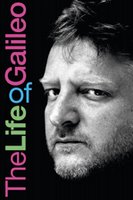
What a little gem of a play, have watched Brecht's 'Mother Courage' and 'Caucasian Chalk Circle' both at The National but never this one before so it was nice to have an entirely new encounter with fresh eyes. Betrayal, renouncing, recanting,... they all have such potent historical reverberations in modern history.
How do we define this thing called Faith? Is that purely religious? What about the faith that Galileo shows in Science and Reason? The faith that young Andreas shows in integrity and truth that he thinks Galileo exemplifies? What have we got in place of faith if we destroy it? Does knowledge corrupt? Is ignorance bliss? Can Brecht be saying that education teaches you doubt and is therefore a destructive force that makes you question everything?
There is a pivotal scene that takes place in Florence with the Grand Duke's tutors where Galileo insists that the debate be held in plain language so that his craftsman friend who does not understand Latin can follow the arguements. He insists on removing the boundaries that seperate academia from the common people, to bring enlightenment to fellow humans who have been deliberately kept out of the dark. But in the end, in an unexpected twist (perhaps another recantment) the book that he gets Andreas to smuggle out of the country is written in Latin. It also becomes the main reason the book survives as its contents are incomprehensible to the border guards. A play to set you thinking about a whole host of issues. SSB was pretty good, played Galileo with such passion and conviction. Watched him before in the Donmar's 'Uncle Vanya' which suited Chekhov's intimate drama which also had Helen McCrory. I'm now looking to pick up a copy of the play to read through.
9.5/10
How do we define this thing called Faith? Is that purely religious? What about the faith that Galileo shows in Science and Reason? The faith that young Andreas shows in integrity and truth that he thinks Galileo exemplifies? What have we got in place of faith if we destroy it? Does knowledge corrupt? Is ignorance bliss? Can Brecht be saying that education teaches you doubt and is therefore a destructive force that makes you question everything?
There is a pivotal scene that takes place in Florence with the Grand Duke's tutors where Galileo insists that the debate be held in plain language so that his craftsman friend who does not understand Latin can follow the arguements. He insists on removing the boundaries that seperate academia from the common people, to bring enlightenment to fellow humans who have been deliberately kept out of the dark. But in the end, in an unexpected twist (perhaps another recantment) the book that he gets Andreas to smuggle out of the country is written in Latin. It also becomes the main reason the book survives as its contents are incomprehensible to the border guards. A play to set you thinking about a whole host of issues. SSB was pretty good, played Galileo with such passion and conviction. Watched him before in the Donmar's 'Uncle Vanya' which suited Chekhov's intimate drama which also had Helen McCrory. I'm now looking to pick up a copy of the play to read through.
9.5/10

No comments:
Post a Comment